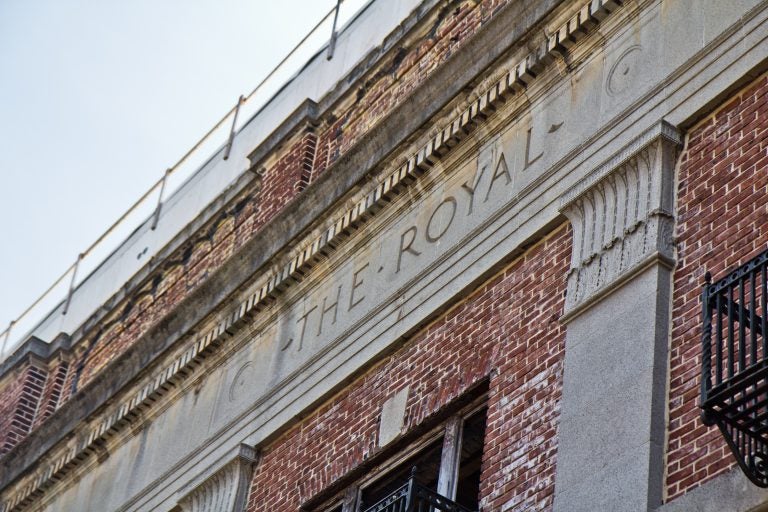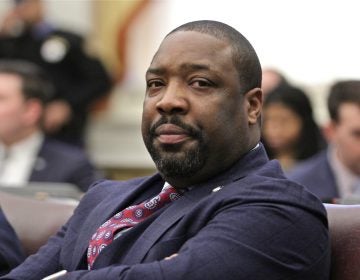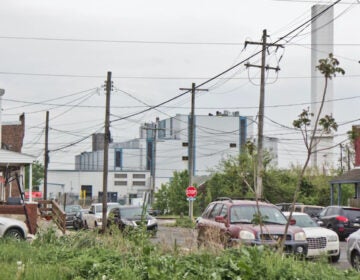Prominent Philly developer testifies in Kenyatta Johnson’s corruption trial
Carl Dranoff was a consultant on a project for which Johnson helped get new zoning. Prosecutors say the lawmaker did that after receiving bribes.

The Royal Theater. (Kimberly Paynter/WHYY)
Universal Companies’ rocky efforts to redevelop the Royal Theater took center stage during the second day of testimony in the federal corruption trial of Philadelphia City Councilmember Kenyatta Johnson.
The historic building is one of two properties at the heart of the high-profile case. Prosecutors say Universal, a prominent developer and charter school operator, bribed Johnson to get the Democratic lawmaker to introduce zoning legislation that would enable the nonprofit’s real estate arm to transform the blighted property into a mixed-use development with residential and retail.
Johnson also allegedly received bribes for helping Universal maintain control of a row of valuable plots along the 1300 block of Bainbridge Street in South Philadelphia — plots that remain vacant today.
In both cases, the bribes were allegedly concealed as payments to a consulting firm led by Johnson’s wife and co-defendant, Dawn Chavous.
“Bribery in the 21st century is not cash in a paper bag delivered in the middle of the night,” Assistant U.S. Attorney Eric Gibson told jurors during his opening statement on Thursday.
Universal bought the decaying theater in 2000 with hopes of opening a live music venue. But the company never had the finances to make co-founder Kenny Gamble’s dream come true, forcing the organization to consider alternatives, according to testimony.
By 2013, Universal was pursuing a mixed-use project on the site, a route that called for the nonprofit to clear three critical hurdles. To start construction, Universal needed new zoning for the site and approval from the Philadelphia Historical Commission to demolish the crumbling brick structure. The organization also hoped the state would reissue a $3 million matching grant it took back after Universal failed to meet the grant requirements.
Without the redevelopment grant, margins on the project would be thin.
This is the situation prominent developer Carl Dranoff agreed to take on when he agreed to help Universal, a former business partner, move the stalled project forward – whether his company ultimately redeveloped the Royal Theater site or not.
“I lived not far from there so I had a personal interest,” said Dranoff. “It was really the key to revitalizing the west side of South Street.”
Of the three hurdles, rezoning the theater was perhaps the smallest headache, in part because the redevelopment project was welcomed by nearby neighbors, who were eager to see Universal remove the eyesore and make good use of the site.
In Philadelphia, opposition from the community has the potential to derail a project if the city’s Zoning Board of Adjustment – the independent body that decides whether a development can exceed height and density regulations – is swayed by their concerns and votes in their favor.
Community opposition is also a potential threat to ordinances council members may introduce to change zoning in their districts.
“When we seek a change, we make sure we have community support,” said Dranoff. “That’s a requirement of ours.”
The zoning component of the redevelopment process was not a non-issue, however.
By the time Dranoff started consulting on the project, a neighbor had filed a conservatorship petition that, if approved by a judge, would have cost Universal the theater. Johnson’s legislation to rezone the property effectively squashed that effort, which would have put the site in the hands of another prominent developer: Ori Feibush, who ultimately did redevelop the theater after it was purchased for $3.7 million.
Prosecutors say Chavous deposited a check for $17,500 from Universal roughly a week before her husband introduced the zoning ordinance for the theater. Her lawyer has said the money was paid out as part of a legitimate contract his client had with the nonprofit.
Defense attorneys also say there was no reason for Universal to bribe Johnson because they had a history of “mutual support.”
“There’s no reason in the world that Universal would have to bribe Mr. Johnson to get his attention on the Royal Theater,” said David Laigaie.
Testimony in the trial continues on Monday.

Subscribe to PlanPhilly
WHYY is your source for fact-based, in-depth journalism and information. As a nonprofit organization, we rely on financial support from readers like you. Please give today.









